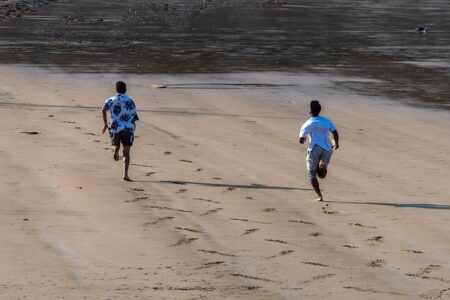As discussions around the future of the Olympic Winter Games continue to evolve, a significant controversy has emerged among snow and ice sports organizers regarding the potential inclusion of cyclocross in the prestigious event. Advocates for traditional winter sports argue that incorporating a summer cycling discipline could dilute the brand, heritage, and identity that have defined the Winter Games for decades. This debate brings to the forefront critical questions about the preservation of sports culture, the integrity of the Olympic movement, and the delicate balance between innovation and tradition in a rapidly changing sporting landscape. As the International Olympic Committee weighs the merits of this proposal, stakeholders from across the winter sports community are voicing their concerns, emphasizing the need to safeguard the unique character that distinguishes the Winter Games from its summer counterpart.
Concerns Over Brand Integrity: Snow and Ice Sports Leaders Voice Opposition to Cyclocross Inclusion
In a recent outpouring of concern, leaders from snow and ice sports have rallied against the potential inclusion of cyclocross in the Olympic Winter Games. These stakeholders argue that integrating a non-traditional winter sport could compromise the essence and longstanding traditions of established winter disciplines. Critics have voiced the following perspectives:
- Dilution of Brand Identity: Introducing cyclocross may confuse audiences about what constitutes a winter sport.
- Heritage Concerns: Traditional winter sports have deep historical roots that they fear could be overshadowed.
- Potential Audience Fragmentation: Diversifying the Olympic program might alienate enthusiasts of core winter sports.
As discussions unfold, many snow sports governing bodies have begun to chart a path forward that prioritizes their unique legacies. These organizations have outlined their priorities, including:
| Priority | Description |
| Maintain Traditional Events | Focus on preserving the integrity of established competitions. |
| Protect Athlete Interests | Ensure that athletes in winter sports are not overshadowed by newer additions. |
| Foster Community Unity | Encourage collaboration among snow and ice sports federations to maintain a cohesive brand. |
Preserving Heritage: The Impact of Cyclocross on Winter Olympic Identity and Tradition
The proposal to include cyclocross in the Winter Olympic Games has ignited heated debates among sports organisers, athletes, and enthusiasts alike. Critics argue that introducing this summer cycling discipline into the winter sports arena threatens to dilute the brand and undermine the sanctity of heritage traditionally associated with winter sports. They emphasize that the Winter Olympics have historically celebrated a unique identity, characterized by established formats like skiing, snowboarding, and ice hockey, which are deeply rooted in winter culture. Retaining the integrity of this identity is seen as vital not only for preserving the legacy of the games but also for maintaining the passion and loyalty of winter sports fans who cherish these longstanding traditions.
Supporters of cyclocross argue that the sport brings a fresh, exciting dynamic that can attract a broader audience, especially among younger demographics. However, the clash between tradition and innovation leaves critical implications for how the Olympic spirit is articulated through sports. To better understand stakeholders’ perspectives, a survey reveals the following sentiments:
| Stakeholder Group | Support for Cyclocross (%) | Concern about Tradition (%) |
|---|---|---|
| Organisers | 10 | 90 |
| Athletes | 30 | 70 |
| Fans | 40 | 60 |
| Sports Analysts | 25 | 75 |
This data highlights a significant concern among key stakeholders about preserving the essence of winter sports amidst evolving trends and audience preferences. As discussions continue, the future of Olympic identity hangs in the balance, with the potential addition of cyclocross stirring both excitement and trepidation within the sporting community.
Future Recommendations: Balancing Innovation with Authenticity in Winter Sports Competitions
As discussions about the future of winter sports continue, straddling the line between innovation and preserving tradition becomes crucial. Stakeholders must focus on the importance of authenticity in maintaining the unique identity of winter disciplines. This could involve initiatives like:
- Community Engagement: Involving local athletes and communities in decision-making to ensure that any new additions reflect the spirit of winter sports.
- Adaptive Technologies: Implementing innovative technologies in existing sports to enhance competition without undermining their traditional essence.
- Preservation of Heritage: Celebrating the history and distinctive attributes of snow and ice sports through dedicated events and exhibitions.
Balancing these aspects will be key to advancing winter sports in a way that resonates with both athletes and fans. A structured approach could include a feedback loop with stakeholders, allowing for rigorous evaluation of proposals against a heritage framework. The table below outlines potential factors for consideration when evaluating new sports for inclusion in the Winter Games:
| Factor | Importance |
|---|---|
| Community Support | High |
| Alignment with Winter Sports | Critical |
| Financial Viability | Moderate |
| Global Appeal | High |
Key Takeaways
In conclusion, the proposal to include cyclocross in the Olympic Winter Games has ignited a passionate debate among stakeholders in the snow and ice sports community. Advocates for maintaining the integrity and tradition of winter sports argue that adding a predominantly summer sport could undermine the established heritage and identity that the Winter Games have cultivated over the years. As discussions continue, the future of winter sports will hinge on balancing innovation with respect for tradition. As the Olympic movement evolves, stakeholders must carefully assess how best to honor the unique spirit of winter sports while also embracing new opportunities. The final decision will not only shape the landscape of future Olympic events but also define what it means to be a winter athlete in a rapidly changing sporting world.











